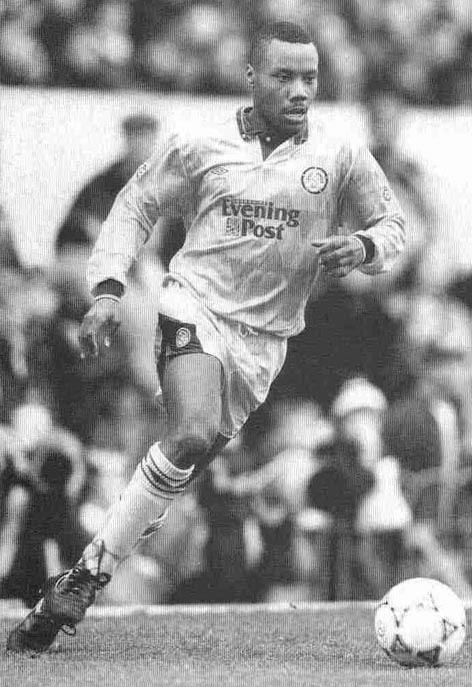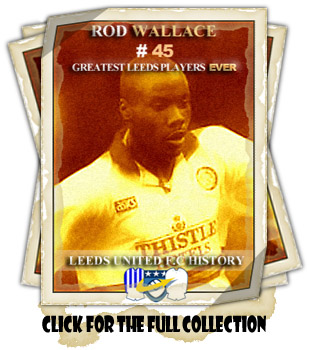

Wallace: Rodney Seymour (Rod)
1991-1998
(Player Details)
Forward
Born: Lewisham: 02-10-1969
Debut: Nottingham Forest (h): 20-08-1991
5’7” 10st 1lb (1992)
#45 in 100 Greatest LUFC Players Ever

He signed for the Saints as trainee in 1986 along with his twin brother Ray. Elder
brother Danny had already become an established member of the Southampton first team. On
22nd October 1988, his two brothers Danny and Ray lined up alongside him in the Southampton
team in a match at The Dell against Sheffield Wednesday; this was the first time three
brothers had played in the same team in English professional top-flight football. His start
at Southampton mirrored that of his twin Ray, but he was quickly being tipped for the top
after some dazzling displays for the Saints and eleven England Under-Twenty-one caps and a
couple of ‘B’ caps followed. He netted forty-five goals in one hundred and one League starts
for Southampton and Leeds won the race to sign him, a tribunal setting the £1.6 million fee
in July 1991. On his day little ‘Hot Rod’s darting runs could slice open any defence and he
enjoyed a superb 1991-92 League championship campaign when his busy feet complemented the
raw power of Lee Chapman as Leeds stormed to the First Division Championship. In September
1992 he was called up for an England trip to Spain, but injury prevented him from going and
after that his confidence seemed to dip, taking his form with it. However, his ‘Goal of the
Season’ against Tottenham Hotspur in April 1994 ranks as one of the greatest solo goals ever
seen at Elland Road, when he cut a swathe through a posse of defenders at pace and curled in
a wonderful shot from just inside the penalty area.His partnership with Brian Deane failed
to come up with the goals and towards the end of 1995-96 a return to Southampton looked on
the cards, but Wallace could not agree personal terms. Many believe his speed made him a
better prospect as a winger rather than an out-and-out striker where competition at Elland
Road became intense as Liverpool and Wales star Ian Rush signed in May 1996 to team up with
Tony Yeboah. Wallace found himself even more marginalized with the arrival of George Graham
as Manager and he would not sign an extension to his contract which was due to expire in
June 1998. This resulted in Wallace joining Scottish giants Rangers on a Bosman transfer. In
Scotland the speedy Londoner acquired a flurry of medals to add to the silverware previously
won during his time in England. In 1999 and 2000 he won the domestic double as Rangers won
both the Scottish Premier League championship and Scottish Cup. These where not to be his
first honours in Scottish Football as he won the Scottish League Cup in 1998 following
Rangers defeat of St Johnstone by two goals to one. He scored fifty-four goals in one
hundred and twenty appearances in all competitions while at Ibrox. In 2001 he headed back to
English football on a free transfer to link up with newly promoted Bolton Wanderers of the
EPL. Wallace successfully helped Bolton stave off relegation back to the lower reaches of
English football but was on the move again after being unhappy with the new one year
contract which was offered to him. He scored three goals and started fourteen League games
and came on another five times as a substitute for the Trotters and scored once in four
games in the Cup competitions of which two were as a substitute. In June 2002 he joined
Gillingham on a two-year contract and managed to score twelve goals in his first full season
at the Priestfield Stadium. His time with the Gills was blighted by a succession of injuries
and at the end of the 2003-2004 season he announced his retirement from professional
football. He scored twelve goals in twenty-seven League starts and nine from the bench as
well as playing four games in the cups, including one as a substitute, without scoring while
with the Gills.